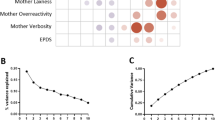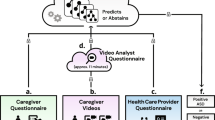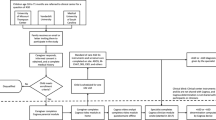Abstract
Background
The Modified Checklist for Autism in Toddlers (M-CHAT) is a common pediatric screening tool with mixed accuracy findings. Prior evidence supports M-CHAT screening for developmental concerns, especially in toddlers born preterm. This study examined M-CHAT accuracy in a large, nationwide sample.
Methods
3393 participants from the Environmental influences on Child Health Outcomes (ECHO) program were included. Harmonized M-CHAT (M-CHAT-H) results were compared with parent-reported autism diagnosis and autism-related characteristics to assess accuracy for term and preterm children, together and separately. Generalized estimating equations, clustering for ECHO cohort and controlling for demographic covariates, were used to examine associations between developmental and behavioral characteristics with M-CHAT-H accuracy.
Results
Sensitivity of the M-CHAT-H ranged from 36 to 60%; specificity ranged from 88 to 99%. Positive M-CHAT-H was associated with more developmental delays and behavior problems. Children with severe motor delays and more autism-related problems were more likely to have a false-negative M-CHAT-H. Children with fewer behavior problems and fewer autism-related concerns were more likely to have a false-positive screen.
Conclusion
The M-CHAT-H accurately detects children at low risk for autism and children at increased risk with moderate accuracy. These findings support use of the M-CHAT-H in assessing autism risk and developmental and behavioral concerns in children.
Impact
-
Previous literature regarding accuracy of the Modified Checklist for Autism in Toddlers (M-CHAT) is mixed but this study provides evidence that the M-CHAT performs well in detecting children at low risk for autism and consistently detects children with developmental delays and behavioral problems. The M-CHAT moderately detects children at increased risk for autism and remains a useful screening tool.
-
This study examines M-CHAT accuracy in a large-scale, nationwide sample, examining associations between screening accuracy and developmental outcomes.
-
These findings impact pediatric screening for autism, supporting continued use of the M-CHAT while further elucidating the factors associated with inaccurate screens.
This is a preview of subscription content, access via your institution
Access options
Subscribe to this journal
Receive 14 print issues and online access
$259.00 per year
only $18.50 per issue
Buy this article
- Purchase on Springer Link
- Instant access to full article PDF
Prices may be subject to local taxes which are calculated during checkout

Similar content being viewed by others
Data availability
Select de-identified data from the ECHO Program are available through NICHD’s Data and Specimen Hub (DASH). Information on study data not available on DASH, such as some Indigenous datasets, can be found on the ECHO study DASH webpage.
References
Maenner, M. J. et al. Prevalence and Characteristics of Autism Spectrum Disorder Among Children Aged 8 Years — Autism and Developmental Disabilities Monitoring Network, 11 Sites, United States, 2020. MMWR Surveill. Summ. 72, 1–14 (2023).
Maenner, M. J. et al. Prevalence and Characteristics of Autism Spectrum Disorder Among Children Aged 8 Years — Autism and Developmental Disabilities Monitoring Network, 11 Sites, United States, 2018. MMWR Surveill. Summ. 70, 1–16 (2021).
van ’t Hof, M. et al. Age at autism spectrum disorder diagnosis: A systematic review and meta-analysis from 2012 to 2019. Autism 25, 862–873 (2021).
Crump, C., Sundquist, J. & Sundquist, K. Preterm or Early Term Birth and Risk of Autism. Pediatrics 148, e2020032300 (2021).
Laverty, C. et al. The prevalence and profile of autism in individuals born preterm: a systematic review and meta-analysis. J. Neurodev. Disord. 13, 41 (2021).
Robins, D. L., Fein, D., Barton, M. L. & Green, J. A. The Modified Checklist for Autism in Toddlers: an initial study investigating the early detection of autism and pervasive developmental disorders. J. Autism Dev. Disord. 31, 131–144 (2001).
Kim, S. H. et al. Predictive Validity of the Modified Checklist for Autism in Toddlers (M-CHAT) Born Very Preterm. J. Pediatr. 178, 101–107.e2 (2016).
Gray, P. H., Edwards, D. M., O’Callaghan, M. J. & Gibbons, K. Screening for autism spectrum disorder in very preterm infants during early childhood. Early Hum. Dev. 91, 271–276 (2015).
Carbone, P. S. et al. Primary Care Autism Screening and Later Autism Diagnosis. Pediatrics 146, e20192314 (2020).
Wieckowski, A. T., Williams, L. N., Rando, J., Lyall, K. & Robins, D. L. Sensitivity and Specificity of the Modified Checklist for Autism in Toddlers (Original and Revised): A Systematic Review and Meta-analysis. JAMA Pediatr. 177, 373 (2023).
Aishworiya, R., Ma, V. K., Stewart, S., Hagerman, R., Feldman, H. M. Meta-analysis of the Modified Checklist for Autism in Toddlers, Revised/Follow-up for Screening. Pediatrics e2022059393, https://doi.org/10.1542/peds.2022-059393 (2023).
Limperopoulos, C. et al. Positive Screening for Autism in Ex-preterm Infants: Prevalence and Risk Factors. Pediatrics 121, 758–765 (2008).
Kuban, K. C. K. et al. Positive Screening on the Modified Checklist for Autism in Toddlers (M-CHAT) in Extremely Low Gestational Age Newborns. J. Pediatr. 154, 535–540.e1 (2009).
Shuster, C. L., et al. Neurobehavioral and Medical Correlates of Autism Screening: 2-Year Outcomes for Infants Born Very Preterm. J Pediatr. 113536, https://doi.org/10.1016/j.jpeds.2023.113536 (2023).
Gillman, M. W. & Blaisdell, C. J. Environmental influences on Child Health Outcomes, a Research Program of the National Institutes of Health. Curr. Opin. Pediatr. 30, 260–262 (2018).
Guthrie, W. et al. Accuracy of Autism Screening in a Large Pediatric Network. Pediatrics 144, e20183963 (2019).
Lord, C., et al. Autism Diagnostic Observation Schedule, 2nd ed. (Western Psychological Services, 2012).
Le Couteur, A., Lord, C., Rutter, M. Autism Diagnostic Interview - Revised (ADI-R) (Western Psychological Services, 2006).
Constantino, J. N., Gruber, C. Social Responsiveness Scale, Second Edition (SRS-2) 2nd ed. (Western Psychological Services, 2012).
Sturm, A., Kuhfeld, M., Kasari, C. & McCracken, J. T. Development and validation of an item response theory-based Social Responsiveness Scale short form. J. Child Psychol. Psychiatry 58, 1053–1061 (2017).
Constantino, J. N. et al. Validation of a Brief Quantitative Measure of Autistic Traits: Comparison of the Social Responsiveness Scale with the Autism Diagnostic Interview-Revised. J. Autism. Dev. Disord. 33, 427–433 (2003).
Bruni, T. P. Test Review: Social Responsiveness Scale–Second Edition (SRS-2). J. Psychoeduc. Assess. 32, 365–369 (2014).
Knapp, E. A., et al. The Environmental Influences on Child Health Outcomes (ECHO)-Wide Cohort. Am J Epidemiol. kwad071, https://doi.org/10.1093/aje/kwad071 (2023).
Robins, D., Fein, D., Barton, M. The Modified Checklist for Autism in Toddlers (M-CHAT). (Self-published, 1999).
Constantino, J. N. Social Responsiveness Scale. In: Encyclopedia of Autism Spectrum Disorders. (ed. Volkmar, F. R.) 2919–2929 (Springer, 2013). https://doi.org/10.1007/978-1-4419-1698-3_296.
Bölte, S., Westerwald, E., Holtmann, M., Freitag, C. & Poustka, F. Autistic Traits and Autism Spectrum Disorders: The Clinical Validity of Two Measures Presuming a Continuum of Social Communication Skills. J. Autism Dev. Disord. 41, 66–72 (2011).
Bayley, N. Bayley Scales of Infant and Toddler Development. 3rd ed. (Harcourt Assessment, 2006).
Achenbach, T. & Rescorla, L. Manual for the ASEBA Preschool Forms & Profiles (Burlington, VT: University of Vermont, Research Center for Children, Youth, & Families, 2000).
Shuster, C. L., et al. Two-Year Autism Risk Screening and 3-Year Developmental Outcomes in Very Preterm Infants. JAMA Pediatr. https://doi.org/10.1001/jamapediatrics.2023.5727 (2023).
Acknowledgements
The authors wish to thank our ECHO Colleagues; the medical, nursing, and program staff; and the children and families participating in the ECHO cohorts. We also acknowledge the contribution of the ECHO Program collaborators. The content is solely the responsibility of the authors and does not necessarily represent the official views of the National Institutes of Health.
Funding
Research reported in this publication was supported by the Environmental influences on Child Health Outcomes (ECHO) Program, Office of the Director, National Institutes of Health, under Award Numbers U2COD023375 (Coordinating Center), U24OD023382 (Data Analysis Center), U24OD023319 with co-funding from the Office of Behavioral and Social Science Research (PRO Core), UH3OD023251 (Alshawabkeh), UH3OD023320 (Aschner), UH3OD023313 (Koinis Mitchell), UH3OD023318 (Dunlop), UH3OD023271 (Karr), UH3OD023347 (Lester), UH3OD023349 (O’Connor), UH3OD023348 (O’Shea), UH3OD023290 (Herbstman), UH3OD023249 (Stanford), UH3OD023279 (Elliott).
Author information
Authors and Affiliations
Consortia
Contributions
C.S., B.C., J.A.H., R.J., T.O., M.O., S.S., L.C.S., L.M.S. contributed significantly to study design. C.S. conducted data analysis and interpretation of results. C.S., P.B., B.C., J.C., V.D., J.G., J.H., J.A.H., R.J., L.M., T.O., M.O., M.P., S.S., L.C.S., L.M.S., P.C.W., B.L. assisted with critical revisions for important intellectual content and approved of the final version.
Corresponding author
Ethics declarations
Competing interests
The authors declare no competing interests.
Ethics approval and conset to participate
All participants provided consent to their respective institutions and all study protocols were approved by each respective Institutional Review Board.
Additional information
Publisher’s note Springer Nature remains neutral with regard to jurisdictional claims in published maps and institutional affiliations.
Supplementary information
Rights and permissions
Springer Nature or its licensor (e.g. a society or other partner) holds exclusive rights to this article under a publishing agreement with the author(s) or other rightsholder(s); author self-archiving of the accepted manuscript version of this article is solely governed by the terms of such publishing agreement and applicable law.
About this article
Cite this article
Shuster, C.L., Brennan, P.A., Carter, B.S. et al. Developmental characteristics and accuracy of autism screening among two-year-old toddlers in the ECHO program. Pediatr Res (2024). https://doi.org/10.1038/s41390-024-03193-5
Received:
Revised:
Accepted:
Published:
DOI: https://doi.org/10.1038/s41390-024-03193-5



